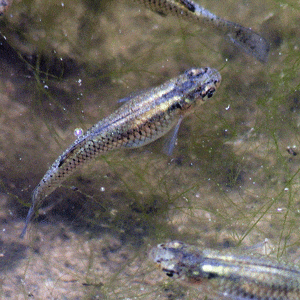Can fish count?
By Siobhan Pipa, on 27 January 2014
Can fish count?
In the first Lunch Hour Lecture of 2014, Professor Brian Butterworth (UCL Institute of Cognitive Neuroscience) asked the rather unusual question: Can fish count?
The peculiarity is not lost on Professor Butterworth, whose introduction includes slides on ‘Why you might think it’s a silly question’: Part 1 and Part 2. But there’s nothing fishy about this topic.
 There are numerous reasons why this could be considered a bit of an unusual subject for a lecture. It’s a common held belief that only humans can process abstract concepts, which numbers essentially are.
There are numerous reasons why this could be considered a bit of an unusual subject for a lecture. It’s a common held belief that only humans can process abstract concepts, which numbers essentially are.
Then, there’s the idea that counting is intrinsically linked to language; to be able to possess the concept of ‘four’, ‘five’, ‘six’ there needs to be a counting vocabulary. As Noam Chomsky said: “The human number faculty [is] essentially an ‘abstraction’ from human language.”
What do we mean by counting?
If, like Chomsky, we consider it the recitation of counting words, then any group without such words cannot count. If, however, we define it as the ability to exactly enumerate the numbers in a set; through either identification or discrimination, counting words are no longer essential.
Most human languages contain counting words, only a few Australian and Amazonian languages do not. But if a language contains no counting words, how is it possible to test the ability to count?
There are a few ways to do this. Firstly, there is identification by selection – matching cards of dots. And then there is discrimination – picking a set with more or fewer objects than another.
The latter produces a phenomenon known as the ‘ratio effect’; when the difference between the two sets is bigger, we can identify either the smaller or larger far more quickly.
Do we really need counting words to count?
The short answer is no, not really. Children who speak only Warlpiri, an Australian language without counting vocabulary, were, according to Professor Butterworth’s study, found to have the same numerical concepts as a group of English speaking indigenous Australian children.
So at least in humans it would seem that a counting vocabulary is not necessary for numerosity but what does this mean for wordless animals?
Professor Butterworth showed a short video of Ai, a chimp at the Matsuzawa Lab in Japan, matching digits to the number of dots and asked us to play along.
She’s fast, far quicker than me and most of the audience. Next, she ordered digits sequentially and very, very rapidly. Oh dear.
Then there was a one-day-old chick counting kinder eggs. Turns out not only can they count quite well, but also add and subtract. Possibly also better than me.
But can fish count?
For a fish, there is definitely safety in numbers. Fish tend to swim in shoals and the bigger the shoal, the safer it is for the fish. But does this indicate numerical capacity?
To test a fish’s numerical skills, researchers trained Mosquitofish to associate a certain number of dots with a reward. When placed in a tank, the fish would routinely pick the gate with the same number of dots.
It would also appear that two fish-heads are better than one. When two humans make a numerical decision together, they are more likely to be correct than doing it individually, an effect known as ‘weighted-confidence sharing’. And fish do exactly the same.
Why is this all important?
So what does this mean to us? It’s believed that some cognitive abilities are inherited, numerical capacity included. Looking at whether or not non-verbal animals have this capacity can suggest whether or not this is true.
Understanding how numerical abilities are developed in the human brain is of huge importance both educationally and individually, and can be used to help develop our understanding of disorders such as dyscalculia.
And with that, Professor Butterworth has helped us dive deeper into the numerical minds of fish and humans. Although Pythagoras, Euclid and Gauss can probably rest easy, it would appear that yes, fish can indeed count – at least a bit, anyway.
The full lecture can be viewed below:
Homepage image: Mosquitofish – Gambusia affinis Credit: U.S. Fish and Wildlife Service (Raver, Duane) Source: Wikimedia Commons
 Close
Close

